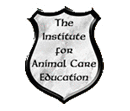The aim of this course is to introduce students to some explanation of animal behaviour.
It gives an insight into a world that, in so many ways, is not unlike our own (although human behaviour does not directly feature). The programme covers a wide range of species with particular interest paid to their natural environment and how they interact.
There is no entry qualification other than an ability to read and respond to written material at this academic level (module one and two of the Introduction to Zoology course would give students a distinct advantage though).
This course is of particular use to anybody considering a career working with animals as it compliments more mainstream subjects such as biology.
Course Modules
1. The Brain and Senses
- What is behaviour, and what is comparative psychology?
- Innate behaviour, and behaviour that is due to the genes of the animal
- Learned behaviour, and the nature-nurture debate
- Basic brain structure and comparing the brains of different species
- Animal senses, hearing, touch, sight, smell, taste, and the differences between different types of animals
2. Mental Processes
- Cognition and cognitive ability
- Hormones and their effects on behaviour
- Are animals intelligent? Defining intelligence and what it means
- Learning and the different ways that animals learn, though social learning, trial and error, and conditioning
- The differences between classical and operant conditioning
- The importance of play
- Imprinting and habituation
- The critical and sensitive periods for learning
- Learned helplessness and abnormal behaviour, stereotypical behaviour
- Animal emotions
3. Protection, Feeding and Mating
- Species that have multiple offspring, and those that have single offspring, and the different methods of care of the young.
- The difference between precocial and altricial young
- Defence against predators, and the different methods of defence
- Natural selection and artificial selection
- Mimicry, and the ways that species can mimic others
- Mating and the different methods of reproduction
- Courtship behaviour
- Food chains and webs
- Herbivores, carnivores and omnivores and the ways they are adapted to different diets
- Parasitism and symbiotic relationships between species
4. Societies and Groupings
- The advantages and disadvantages of living within a group
- Societies and structures, and the hierarchy in groups
- Different forms of reproductive strategies, such as monogamy and polygamy
- Hibernation and aestivation
- Prosocial behaviour
- Group dynamics
- The differences between the sexes - sexual dimorphism
- The evolution of animal societies
5. Environment, Domestication and Captivity
- What is an environment?
- Habitat selection, why do animals choose their particular environment?
- Territories, and the ways that animals defend them from others
- The history of domestication and selective breeding
- Conservation biology and the role of captivity and zoos
- Zoochotic behaviour in captivity
6. Tool Usage and Language
- Defining tool usage in animals
- Cultural transmission and the way that animals learn through watching others
- Examples of the ways that different species use tools to achieve goals
- Communication, and the different methods used by animals
- The advantages and disadvantages of different types of communication
- Language and the ways that bees communicate


Study Level 3
The study Level relates to the how demanding the course is. 1 is beginner and 5 is HND / Foundation Degree level.
6 Module CourseThis course is delivered in 6 study modules which need to be passed to gain the qualification.
Reviews
No reviews were found.

